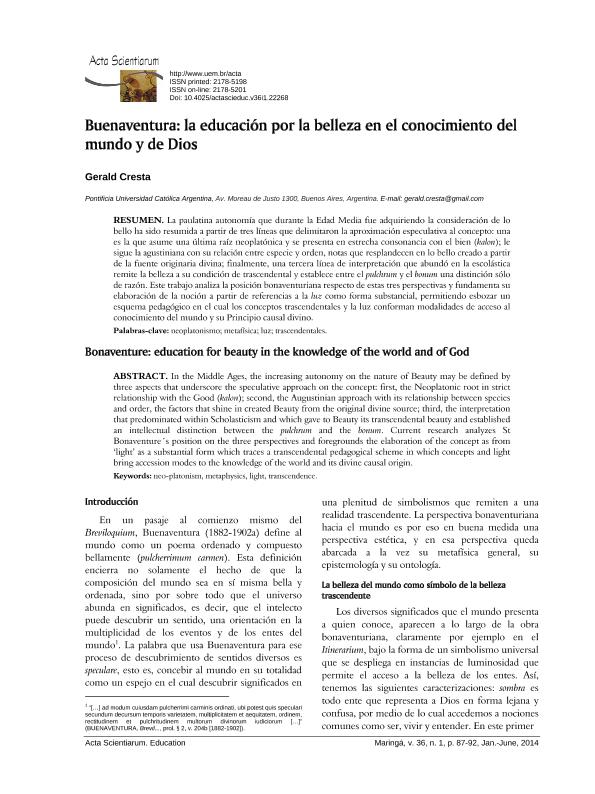Mostrar el registro sencillo del ítem
dc.contributor.author
Cresta, Norberto Gerald

dc.date.available
2017-01-31T14:47:30Z
dc.date.issued
2014-06
dc.identifier.citation
Cresta, Norberto Gerald; Buenaventura: la educación por la belleza en el conocimiento del mundo y de Dios; Universidade Estadual de Maringa; Acta Scientiarum. Education; 36; 1; 6-2014; 87-92
dc.identifier.issn
2178-5198
dc.identifier.uri
http://hdl.handle.net/11336/12225
dc.description.abstract
La paulatina autonomía que durante la Edad Media fue adquiriendo la consideración de lo bello ha sido resumida a partir de tres líneas que delimitaron la aproximación especulativa al concepto: una es la que asume una última raíz neoplatónica y se presenta en estrecha consonancia con el bien (kalon); le sigue la agustiniana con su relación entre especie y orden, notas que resplandecen en lo bello creado a partir de la fuente originaria divina; finalmente, una tercera línea de interpretación que abundó en la escolástica remite la belleza a su condición de trascendental y establece entre el pulchrum y el bonum una distinción sólo de razón. Este trabajo analiza la posición bonaventuriana respecto de estas tres perspectivas y fundamenta su elaboración de la noción a partir de referencias a la luz como forma substancial, permitiendo esbozar un esquema pedagógico en el cual los conceptos trascendentales y la luz conforman modalidades de acceso al conocimiento del mundo y su Principio causal divino.
dc.description.abstract
In the Middle Ages, the increasing autonomy on the nature of Beauty may be defined by three aspects that underscore the speculative approach on the concept: first, the Neoplatonic root in strict relationship with the Good (kalon); second, the Augustinian approach with its relationship between species and order, the factors that shine in created Beauty from the original divine source; third, the interpretation that predominated within Scholasticism and which gave to Beauty its transcendental beauty and established an intellectual distinction between the pulchrum and the bonum. Current research analyzes St Bonaventure´s position on the three perspectives and foregrounds the elaboration of the concept as from ‘light’ as a substantial form which traces a transcendental pedagogical scheme in which concepts and light bring accession modes to the knowledge of the world and its divine causal origin.
dc.format
application/pdf
dc.language.iso
spa
dc.publisher
Universidade Estadual de Maringa

dc.rights
info:eu-repo/semantics/openAccess
dc.rights.uri
https://creativecommons.org/licenses/by-nc-sa/2.5/ar/
dc.subject
Neoplatonismo
dc.subject
Metafísica
dc.subject
Luz
dc.subject
Trascendentales
dc.subject.classification
Teología

dc.subject.classification
Filosofía, Ética y Religión

dc.subject.classification
HUMANIDADES

dc.title
Buenaventura: la educación por la belleza en el conocimiento del mundo y de Dios
dc.title
Bonaventure: education for beauty in the knowledge of the world and of God
dc.type
info:eu-repo/semantics/article
dc.type
info:ar-repo/semantics/artículo
dc.type
info:eu-repo/semantics/publishedVersion
dc.date.updated
2017-01-30T16:03:22Z
dc.identifier.eissn
2178-5201
dc.journal.volume
36
dc.journal.number
1
dc.journal.pagination
87-92
dc.journal.pais
Brasil

dc.journal.ciudad
Maringá
dc.description.fil
Fil: Cresta, Norberto Gerald. Consejo Nacional de Investigaciones Científicas y Técnicas; Argentina. Pontificia Universidad Católica Argentina "Santa María de Los Buenos Aires"; Argentina
dc.journal.title
Acta Scientiarum. Education
dc.relation.alternativeid
info:eu-repo/semantics/altIdentifier/url/http://periodicos.uem.br/ojs/index.php/ActaSciEduc/article/view/22268
dc.relation.alternativeid
info:eu-repo/semantics/altIdentifier/url/http://dx.doi.org/10.4025/actascieduc.v36i1.22268
Archivos asociados
